The American dream is constructed as follows: there is nothing you can’t achieve if you work hard and believe in America. That’s why it’s called a dream, since the reality is far from so idyllic. But those attempts that fall by the wayside toward that dream vigil can be as wonderful as they are peculiar, like this next one we’re about to dive into, starring Joan Jett Blakk and witnessed by the America of the mid-1980s and throughout the 1990s.
Joan Jett Blakk, stage name and alias of Terence Alan Smith (Michigan, Detroit, 1957) was a dream come true. And like any dream, it seeded the earth and transcended into future generations like the echo of a slow but steady gong that is hard to say goodbye to. Activist, political candidate, defender of race, freedom, sexual diversity, drag queen who created her alter ego in 1974 inspired by artists such as David Bowie, Grace Jones or Divine and a long list of many other names, to which controversy and scandal followed her throughout her political career, would be some of the words that define, among many others, this public person who used her image, her voice and verve to vindicate the simple and pure right to have rights. Starting with the most basic of all, to which every human being by a certain inertia tends to cling: the right to live once born.
Let’s look back and try to assimilate the climate of events in which this broth was cooked. It could be said that the main ingredient was HIV, a major protagonist of the 1980s scene but with blurred and scattered beginnings. The first Western cases are attributed to three sailors: an Englishman (back in 1959), an American (in 1969) and a Norwegian (1976) who had traveled to African countries and had contracted the virus after having unprotected sex with HIV-positive people. It was not until about 1983 when a group of nine homosexual men in the city of LA, who had had sex with each other and had contracted the virus, began to present the same (or very similar) clinical picture of symptoms and served as a basis for establishing a pattern of contagion typical of infectious diseases. But its origins are actually in Central Africa around the 1920s.
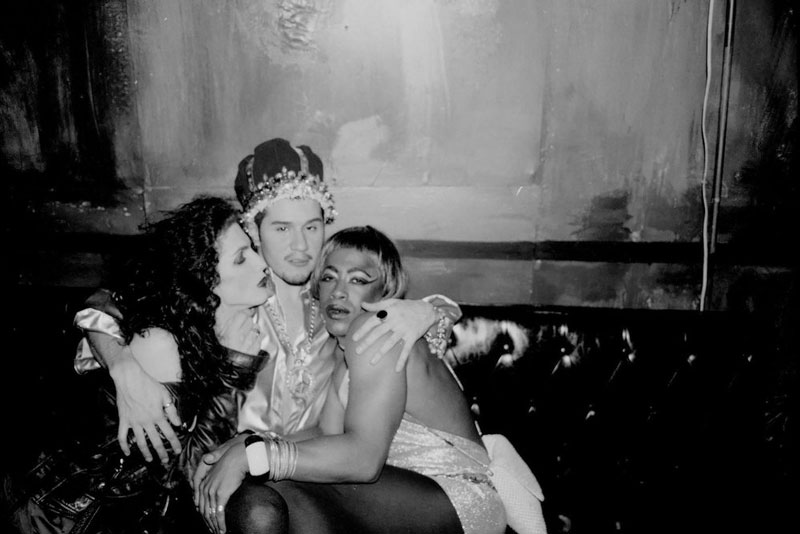
By 1984, HIV had spread throughout the West, initially nesting in the homosexual community. The rejection this generated in the population was unconscionable. The lack of information and scarcity of remedies, together with the worst in every human being, caused the community to be rejected and repudiated (not to say something too ugly) and in some schools infected children were denied the right to attend school. Hospitals were increasingly filled with HIV-positive people and consequently, lovers and family members began to separate. How many times have we read and heard the phrase “She died in my arms”. It was even called the “pink plague”, not only because of the obvious homophobic connotation, but also because of the pinkish spots that usually appeared on the infected patient. The virus soon spread massively among heterosexuals as well, and the LGTBIQ+ community began to be demystified, although this did not stop the insults, harassment and aggressions directed at the community.
It is there, in the midst of this maelstrom, confusion and chaos, with morgues full, hospitals without answers and politicians inside their offices and occupying luxurious seats at charity galas in (poor) favor of the most disadvantaged, when Blakk makes a fist on the table and says: So much for this! And what does Joan do? She runs for mayor of Chicago against Richard M. Daley, a defeat that trained her for the real battle: the candidacy for the presidency of the United States in 1992. Her slogan? Hold on… “Lick Bush in ’92” (he ran against Bush Sr. and Bill Clinton). Literally it means “suck that Bush”, but figuratively the meaning is even better: “eat this pussy”, since bush in English is part of the surname of the politician George H.W. Bush, father of George W. Bush. Bush, father of George W. Bush, also means bush, understood in slang as pubic hair.
Later, in 1996, she ran again under the slogan “Lick Slick Willie in ’96”. She did not win either candidacy, but she made several things visible by running, both times, for the Queer Nation Party, of which she also happened to be one of the founders in 1990. The ’92 campaign’s promotional poster is worthy of taking up an entire wall in a museum or your living room, perhaps. It was a mixture of a photographed battle cry featuring Joan sitting in a splendid wicker chair, with what looks like a somewhat abstract toy machine gun and a pose that brilliantly and not at all coincidentally mimics the famous photograph of journalist, co-founder and inspirational leader of the Black Power socialist political organization known as the Black Panthers, Huey Percy Newton. He also made a campaign promotional video that you can find on YouTube if you type in the search engine Drag Queen Blues (highly recommended).
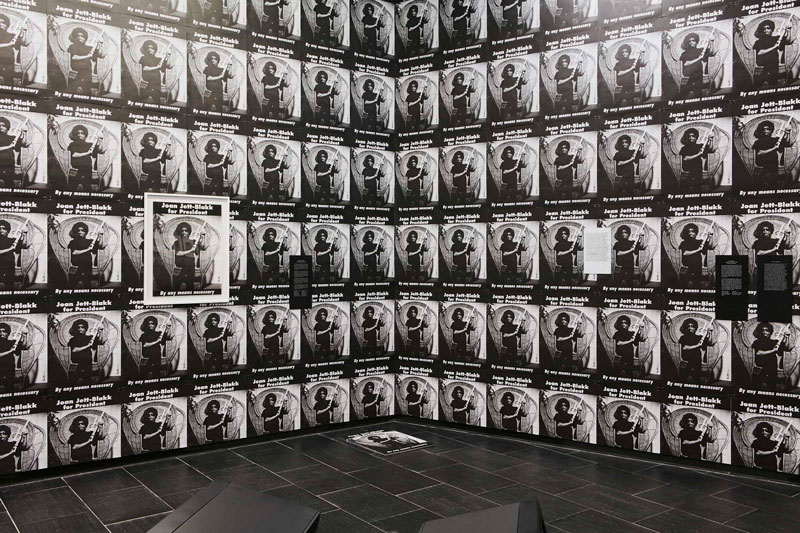
And fully aware that she would never even set foot on the lawn of the garden where America’s First Dog defecated, Joan Jett Blakk began a campaign to raise awareness and rights: Right to life, right to be cared for in hospitals without having to sell a kidney in a dark alley, right to love, right not to die of AIDS without decent medical care, right to public and free health care! The right to hold hands with your partner without being shouted at as a faggot (faggot, of what!). Right to have a president or female president who was knowledgeable about realities, someone who would have held his or her lover in his or her arms and knew he or she was dying, wrote photographer Zoe Leonard in a wonderful speech. Right to live and love freely, in short. Joan was also one of several activists who made visible the group ACT UP (AIDS Coalition to Unleash Power) of which she was a faithful member, a very important collective in defense of the rights of HIV-positive people and created, among other things, in 1987, to raise awareness of the AIDS crisis, obtain favorable legislation, promote scientific research, optimize and emphasize assistance to the sick and improve education around sexual policies.
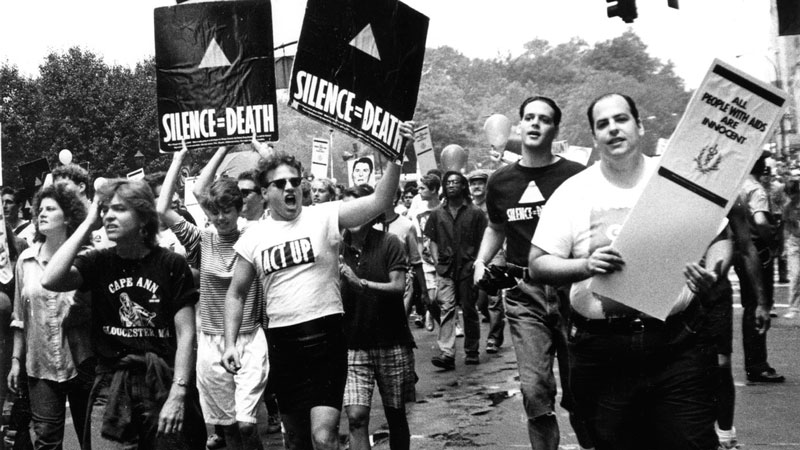
During the 1980s, HIV activists were already taking to the streets to protest strongly against government inaction and institutionalized homophobia, two of the pillars of the social crisis of the 1990s. By 1991, 340,000 cases of HIV infection had been recorded and the situation continued to escalate unsustainably. Therefore, his goal was never to win, but to make noise and leave his mark, and in the process turn America into a more fabulous, more fruitful and more glamorous nation, as our Joan once declared.
We need to go out in the streets to protest every stupid decision they (politicians) make, we need to go out in the streets and be open about who we are with everyone. We need to hold hands in public. We need to trust each other even if we don’t agree on certain opinions. We need to let each other know when that shirt doesn’t match those pants at all. And we need to get out and vote. I mean, it’s not the only way to take over the country and move towards a more glamorous way, but it’s a sure way to do it. And I don’t think any stone in the road will interrupt our struggle towards freedom and decent government! I love you, I mean it.
(Excerpt from a speech by Joan Jett Blakk, US presidential candidate, in the fall of 1992 in an article published by Shari James for THING: Chicago’s national black underground queer arts magazine).
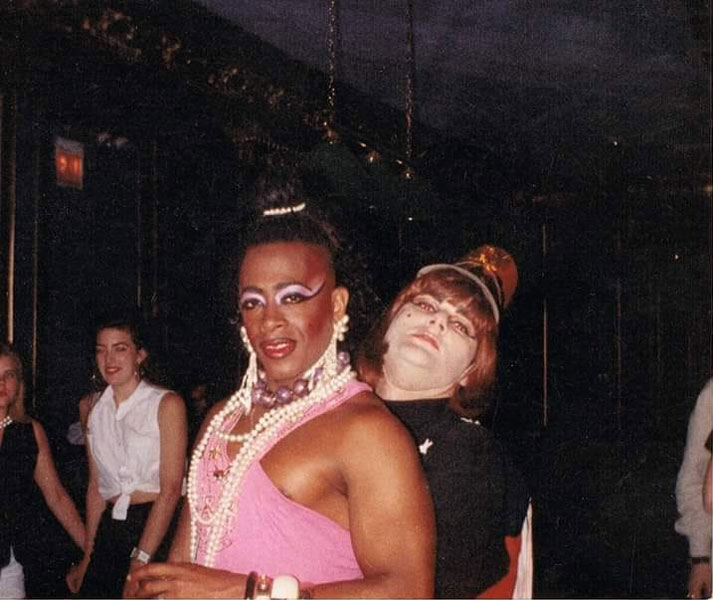
I can’t imagine what it must have been like to live in the 90’s, to open a magazine and read that. Contagious or not, Blakk was fighting for all human beings in this world to have the right to survive a passive and cynical institutional cruelty that did not look beyond its white and comfortable navel. And despite her failure to become the first black, drag radical, queer and pro-social rights (but for real, I mean) president of the United States of America, I am convinced that she drew smiles, drew tears, made two hands or two mouths of the same gender clasp and kiss in public, granted hope and turned out to be a firm and shining pillar in the construction of the society we live in today, which despite not being perfect, is a little bit more open, made things a little bit easier, as she declared years later and has more freedom of presence and diversity thanks to people like our Joan Jett Blakk. Goddess, queen, drag and star… until the grave.
You can find a short 10 minute documentary available on Vimeo called The Beauty President where you can recognize a Joan Jett Blakk of the future, making a retrospective of how beautiful her past was. Until then… Beauty all around me.

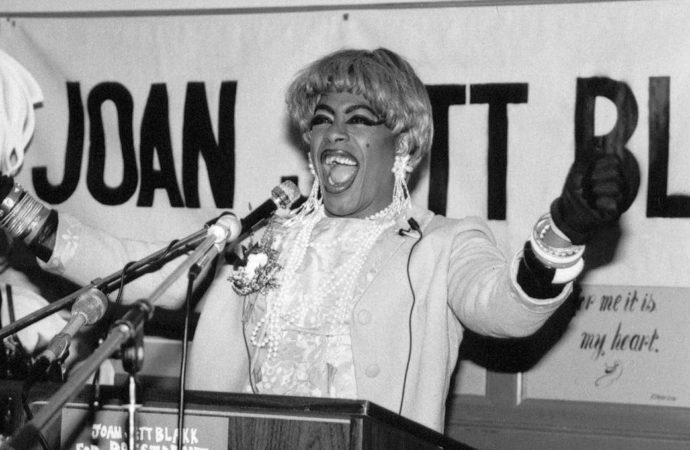
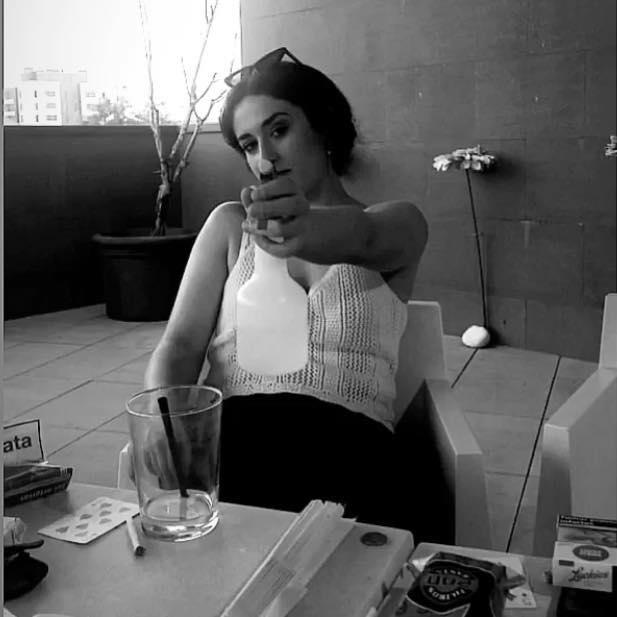

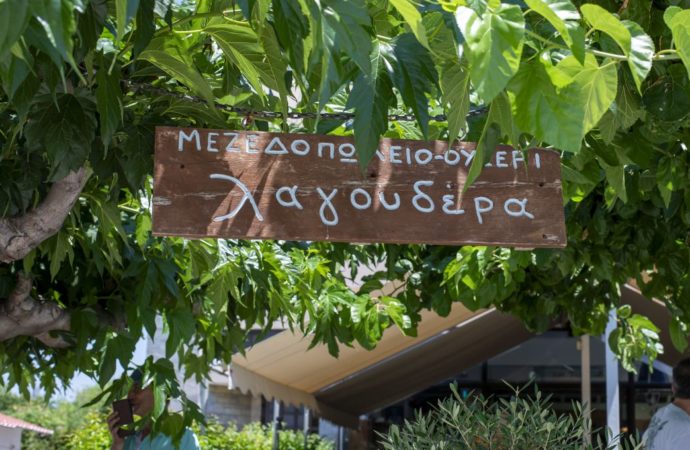
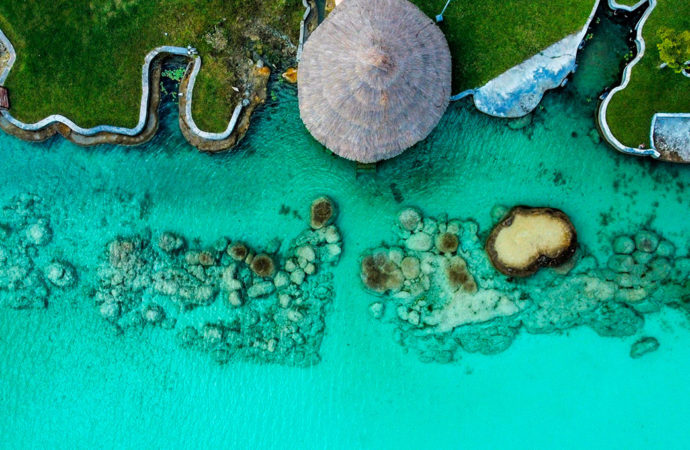
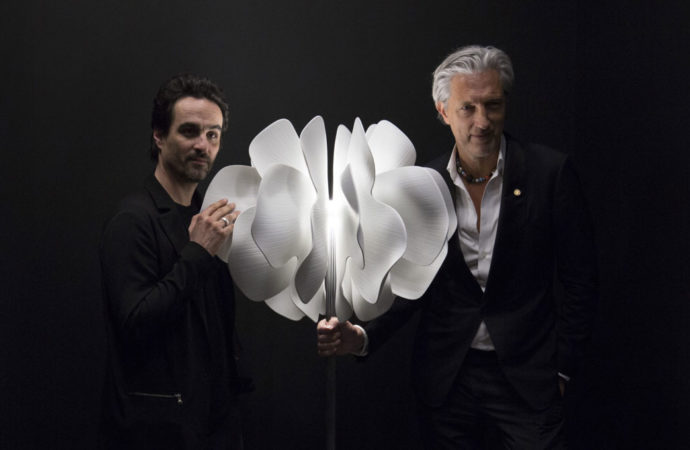
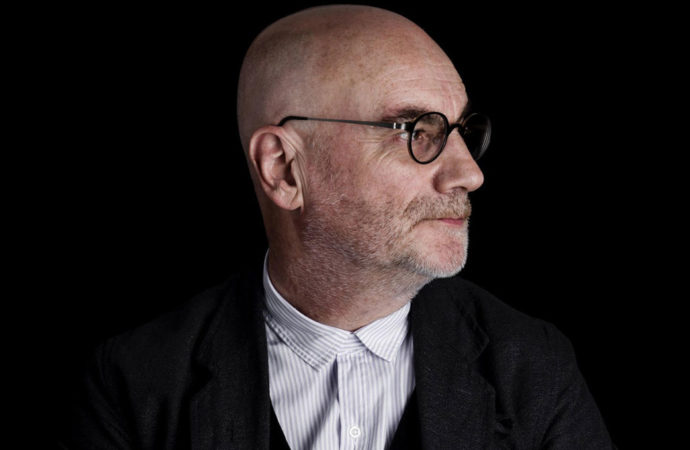
No one has posted any comments yet. Be the first person!